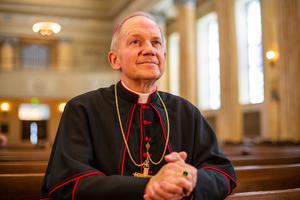Bishop Paprocki: Local Latin Massgoers Are ‘Faithful Catholics’
‘I find the people there are very docile to the teachings of the Church, very eager to follow the teachings of the Church,’ Bishop Paprocki said.

As the Vatican begins to crack down on bishops who issued dispensations for parishes that offer the Traditional Latin Mass, at least one bishop is defending the Latin Mass community within his diocese and urging a more localized approach.
Bishop Thomas Paprocki of the Diocese of Springfield, Illinois, told CNA that the Latin Mass community in his diocese has been faithful to the Church and that bishops should be given the authority to allow these faithful Masses to continue.
“I think the local diocesan bishops are much more in tune with what’s going on in their diocese than an office in Rome,” Bishop Paprocki said.
On July 16, 2021, Pope Francis issued a motu proprio titled Traditionis custodes, which directed bishops to designate locations for Latin Masses but stated that none of those locations be in parish churches. Because some parishes already had thriving Latin Mass communities, a number of bishops offered dispensations to allow certain parishes to continue offering the Latin Mass.
Cardinal Arthur Roche, the prefect for the Dicastery for Divine Worship and the Discipline of the Sacraments, on Feb. 21 issued a rescript, which is a formal clarification from the Vatican. It states such dispensations are reserved to the Holy See and orders bishops who had already offered dispensations to “inform the Dicastery for Divine Worship and the Discipline of the Sacraments, which will evaluate the individual cases.”
In a letter that accompanied Traditionis custodes, Pope Francis justified his initial restrictions by alleging that the celebration of the more ancient form of the Mass “is often characterized by a rejection not only of the liturgical reform, but of the Vatican Council II itself.”
Bishop Paprocki, who has celebrated Mass at both churches within his diocese that offer the Latin Mass, told CNA that he has “not seen that at all” within those communities.
“I find the people there are very docile to the teachings of the Church, very eager to follow the teachings of the Church,” Bishop Paprocki said. “They’re very faithful Catholics.”
The bishop also questioned whether the rescript is consistent with the Holy Father’s original intention in Traditionis custodes and noted that Cardinal Roche took the initiative on this clarification, rather than Pope Francis. He explained that Traditionis custodes is a motu proprio and as such is a papal decree of the pontiff’s own initiative. A rescript, which is what the clarification was, is a response to a request initiated by someone else — in this case, Cardinal Roche.
“It wasn’t the Holy Father taking the initiative,” Bishop Paprocki said, but rather an “initiative of Cardinal Roche.”
Bishop Paprocki noted that the pope’s accompanying letter suggested that his intention was to empower the bishops. In the letter, the pope told bishops “it is up to you to authorize … the use of the ‘Missale Romanum’ of 1962” and “it is up to you to … determine case by case the reality of the groups which celebrate with this ‘Missale Romanum.’”
“I question the wisdom of [the rescript] under the principle of subsidiarity,” the bishop said. He said subsidiarity suggests these decisions are made “usually at a local level.”
Because there had already been rumors that the Vatican would centralize authority in this matter, Bishop Paprocki preempted the rescript by taking additional action to ensure that Traditionis custodes would not affect any of the Latin Masses within his diocese.
In January 2022, Bishop Paprocki formally redesignated Sacred Heart in Springfield as a non-parochial church. He was able to do this because the parish, St. Katharine Drexel Parish, already had two churches.
“Just to remove any doubt … I was able to redesignate that church,” Bishop Paprocki said. “That took care of Sacred Heart Church.”
Now the only parish church that offers the Traditional Latin Mass is St. Rose of Lima in Quincy, whose priest is a member of the Priestly Fraternity of St. Peter (FSSP). Because the FSSP received a dispensation from the Vatican, Paprocki said the rescript would not apply to them, based on his understanding. He said the dispensation “gave them permission to continue doing what they’re doing.”
Yet, throughout the country, some churches that offer the Latin Mass are still only functioning under dispensations provided by their bishops. CNA reached out to several of those dioceses but only received responses from two by the time of publication.
A spokesperson for the Archdiocese of Denver said the archdiocese “will comply with what is asked” and a spokesperson for the Diocese of Lake Charles, Louisiana, said the diocese “makes every effort to comply with canonical and liturgical law and relies upon its legal experts trained at pontifical universities to offer guidance.”
Some dioceses, such as the Diocese of Arlington, have already received permission from the Vatican to offer dispensations for certain parishes. These dispensations are only temporary and will expire after a certain amount of time. In the case of Arlington, three parishes received a dispensation guaranteed for two years: St. Anthony Mission in King George County, St. Rita in Alexandria, and St. John the Beloved in McLean. The bishop also designated five other options for the Latin Mass that are not within parish churches.
In other dioceses, such as the Diocese of Winona-Rochester, bishops sought to accommodate Latin Mass goers by giving them new locations that are not within parish churches. In the case of Winona-Rochester, Bishop Robert Barron designated a new chapel for the celebration of Latin Mass that is not within a parish church.
- Keywords:
- bishop paprocki
















